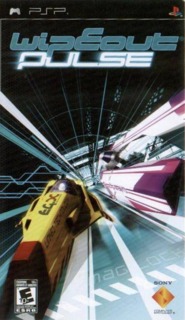WipEout Pulse makes a compelling case as the best game in the series through sheer offerings of content.
That is, not much about the gameplay in Pulse deviates from its predecessor on the PSP, WipEout Pure. The series lives and dies by a certain creed: 1) negotiate turns by pitching the ship instead of braking, 2) hit boost pads to gain precious seconds on the competition, 3) use weapons (rockets, mines, earthquakes, etc.) to hassle your opponents, and 4) avoid getting overwhelmed by the intense speed.
Established racing ships (Feisar, Auricom, etc.) also return, though this time around, the game treats them more like "teams" than ships. That one ship still represents the entire team, but a player's loyalty to a particular ship (measured by the frequency of that ship's usage) accumulates over the course of the game. The most prominent incentive for establishing loyalty to a team is unlockable skins to outfit that ship with. On a more subconscious level, players can track their team's total loyalty points across all players in the world through the game's official website.
Pulse attempts to make a stand as the best in the series through sheer offerings of content. While Pure offered a fairly meager amount of tracks and ships on the shipping disc, Pulse gives players much more to do with all of that content through its new career mode that explores every possible combination of track, event, and speed class in the game.
The game ditches the linear progression of previous games in favor of a grid-based structure. Sixteen grids await for players to complete, each with a dozen or more individual events. The amount of events to take on seems daunting at first, but this is a portable game after all. The game encourages players to digest the events in the same way they are laid out on the grid: bite-sized morsels. Getting gold medals in every single event in the career won't happen overnight. Once players have conquered the career, however, Studio Liverpool offers Racebox: a mode where players create their own grids of events. Every parameter, from the prohibition of weapons to the required time to beat for a gold medal, can be manipulated.
Pulse offers several distinct event types, though most of them fall into one of two categories: solo and competitive. Eliminator is the most interesting new addition, where victory goes to the ship that incapacitates the most opponents; good for a few thrills, but doesn't fit particularly well into WipEout's narrow point-to-point tracks. Speaking of tracks, the ones in Pulse sport mostly cosmetic changes (and the environments sport impressive detail), but the diverse and branching paths of Pure's tracks appear to have been left behind in favor of more straightforward me-too layouts, a disappointment for sure.
A photo mode probably doesn't spring to mind as the first thing people would want out of a PSP game, but lo and behold: Pulse has it. Taking screenshots from any angle or perspective does give players a chance to check out the nice scenery they usually miss while racing. However, custom soundtracks, a surprisingly underutilized feature in PSP games, can also be implemented should players tire of the included techno music from established artists.
And now, the feature WipEout fans have been waiting patiently on for years: online multiplayer. Pulse is the first PSP game that utilizes PlayStation Network accounts (finally creating some sense of unity between the PSP and PS3 online services). The multiplayer itself is functional and finally gives series' fans a taste of real competition, but the online interface itself usually brings down the experience. Finding an existing game is rare, finding enough players to fill out a game is even rarer, pointless 50-second waiting periods fill the gaps between rounds, and players have no means to communicate with one another – not even text. On the bright side, players can show off their customized and unlocked ship skins online.
Customized skins? Yes, now players can put that personal touch to the ship's paint jobs though a Java-based editor available through the game's official website. Players can even download other's ship designs should they find their own artistic abilities lacking. And to round out the online package, Pulse is poised to follow in Pure's footsteps by offering a wealth of downloadable tracks, ships, and music (the first batch of which is already available in the European version… for a price).
If this review reads too much like a feature list, then the game is doing its job. WipEout Pulse represents Studio Liverpool's most focused and complete effort on the series to date, and it takes advantage of everything the PSP has to offer. If the core gameplay wasn't still so damn fun, there wouldn't be much else to discuss beyond the new features. I suppose the title of "best portable racing game ever made" will have to suffice.

